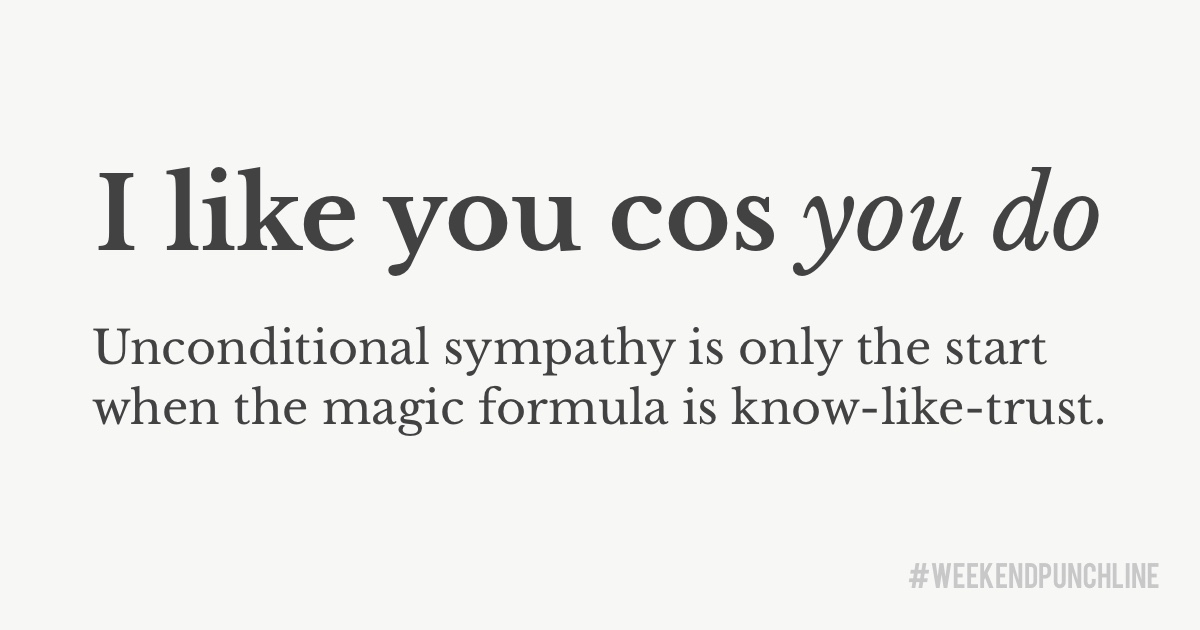About (un)conditional sympathy
You hired a professional who is doing a great job. His name is Ramon. He delivered what he promised. The conversations with him are serious and to the point. He is not a big small talker. Sometimes you wonder how he reacted if you threw a joke at him. Would he say something or just let the moment pass in uncomfortable silence? He would probably take a long breathe and wait for another question you have.
Ramon works like a ticket machine. You give him the required information: where your business is now (point A) and where you want to go (point B). He confirms your journey, displays the route to your destination and requests your payment. He is versatile because you can pay him in cash, by credit card, debit card or iris. He can read your eyes. When confirmed, he prints out your ticket and the receipt. Job done.
If you wish any guidance to your destination during the journey, that costs extra. Since Ramon is a machine fixed to his geographical location, he cannot do it himself. But he knows a guy he would be happy to refer you to. If you agree, Ramon would receive a commission for the referral. Ramon is also a businessman.
Would you do business with Ramon?
A lot of people do. Task-based money transaction is my name for this kind of relation. Ramon receives a task, performs the task, receives the money and confirms the payment.
Are you then really questioning why machines will replace your workforce?
Understand that Roman only fulfills one element of the know-like-trust formula. Still, you buy from him and do not see how shortsighted you are.
I am not shortsighted. I simply need someX [1] to get this task done.
What if there is more value you do not see with your pair of eyes? What if these finished tasks are only plugging the holes while the ship as a whole has been sinking for a while? With open eyes, you run into a wall. The problem is: You will only notice once it hit you hard.
You trust Ramon because you know he works. You have no idea who he really is because he is not sharing personal information with you. You have a hard time feeling more than neutral towards him. You can neither like nor dislike him. You appreciate his existence and functionality.
Is this the kind of professional you want to talk to at your dinner table?
I doubt it.
Friendship in business
I have been working with clients since 2004 (with some breaks). So, you could say I have been in the school of client-centric work for 13 years — the same amount of time I studied in primary and secondary school. Over the years, I developed a distaste with how I worked with clients on a meta level, not on a personal level. I was doing exactly what Ramon did: Receive request, perform task, receive money, confirm payment.
Recently I stumbled upon the notion of H2H (Human to Human), an attempt to break the existing paradigm of B2C and B2B and make clear that behind every business/brand there is a human.
So, some weeks ago I defined a basic formula of how I want to do business with another human person:
Let’s be friends first and do business after. Money follows value follows chemistry. If we have proper wires connecting us, there is a chance we’ll do business together.
Why do you like someone?
Do you like someone because he does something (for you), do you like someone because he likes you, or do you like someone out of the blue?
Friendship starts with the feeling of sympathy and connection. You have not given anything substantial value except for the time you spent interacting with your new acquaintance.
Building up a friendship is like building up a startup. You try building many, most of them will fail but the ones with the most rewarding resonance will make it through the pilot phase and be actually produced further.
Conclusion: I want to answer the question in the style of the chicken-egg problem combined with recursion.
I like you because you, too.
This was episode 33 of the #weekendpunchline 👊. Every Saturday and Sunday.
—
Footnote:
[1] In the future I’m expecting the differentiation of „someone“ and „something“ to vanish, which is why „someX“ will mark the beginning hybridization of human and machine.
Also published on Medium.
